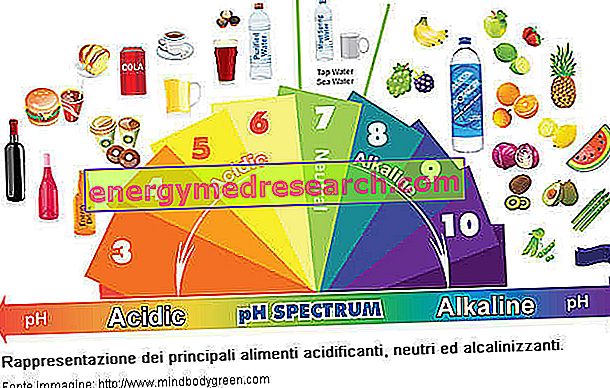Voriconazole is an azole-type antifungal (or antifungal) drug.
Voriconazole - Chemical Structure
Voriconazole is an analogue of fluconazole (another antifungal drug), but - compared to the latter - it has a broader spectrum of action.
Indications
For what it uses
The use of voriconazole is indicated for the treatment of:
- Invasive aspergillosis;
- Candidemia in non-neutropenic patients;
- Serious and invasive infections caused by fungi of the genus Candida resistant to fluconazole;
- Serious infections caused by fungi of the genera Scedosporium and Fusarium .
Warnings
Before taking voriconazole, you must inform your doctor if you are in any of the following conditions:
- If in the past allergic reactions have occurred following the intake of other azole-type drugs;
- If you suffer from liver disease;
- If you suffer from heart disease, such as arrhythmias and prolongation of the QT interval (the interval of time required by the ventricular myocardium to depolarize and repolarize).
Voriconazole therapy may cause photosensitivity reactions, therefore direct exposure to the sun and UV rays should be avoided.
Furthermore, with prolonged use of voriconazole, there is an increased risk of developing skin cancer.
Interactions
Concomitant administration of voriconazole and the following drugs should be avoided due to possible side effects that may occur:
- Terfenadine and astemizole, antihistamine drugs;
- Cisapride, a drug able to increase gastrointestinal motility;
- Pimozide, an antipsychotic;
- Quinidine, an antiarrhythmic;
- Rifampicin and rifabutin, antibiotic drugs;
- Efavirenz and ritonavir, antivirals used in the treatment of HIV;
- Carbamazepine, phenytoin and phenobarbital, drugs used in the treatment of epilepsy;
- Ergot alkaloids (such as ergotamine and dihydroergotamine), drugs used to treat migraine;
- Sirolimus, an immunosuppressive drug;
- St. John's wort (or St. John's wort), a medicinal plant with antidepressant properties.
Also, you need to tell your doctor if you are taking any of the following medications, because - if you need to start concomitant therapy with voriconazole - you may need to adjust the usual doses of medication:
- Warfarin and other anticoagulants;
- Cyclosporine, tacrolimus and other immunosuppressive drugs;
- Oral hypoglycemic agents ;
- Statins, used against high cholesterol;
- Benzodiazepines ;
- Omeprazole ;
- Vincristine and vinblastine, anticancer drugs;
- Indinavir and other drugs used to treat HIV;
- Methadone ;
- Fentanyl and other opioid analgesics;
- Ibuprofen, diclofenac and other NSAIDs;
- Fluconazole, another antifungal.
In any case, it is still advisable to inform your doctor if you are taking - or have recently been - any type of medication, including non-prescription medicines and herbal and / or homeopathic products.
Side effects
Voriconazole can cause various side effects, although not all patients experience them. This depends on the different sensitivity that each individual has towards the drug. Therefore, it is not said that the undesirable effects occur all with the same intensity in each person.
Below are listed some of the side effects that may occur during voriconazole therapy.
Skin and subcutaneous tissue disorders
Treatment with voriconazole may cause:
- Skin eruptions;
- Itch;
- Hair loss;
- Systemic lupus erythematosus;
- Skin cancer.
Hepatobiliary disorders
Voriconazole therapy can cause enlargement of the liver and promote the onset of liver failure, jaundice and gall bladder stones.
Gastrointestinal disorders
Treatment with voriconazole may cause:
- pancreatitis;
- Inflammation of the duodenum;
- Inflammation of the peritoneum;
- Nausea;
- He retched;
- Diarrhea;
- Stomach pain;
- Constipation;
- Indigestion.
Pathologies of the central nervous system
Voriconazole therapy may cause:
- Drowsiness;
- dizziness;
- Tremors;
- Pins and needles;
- Involuntary muscle movements;
- Convulsions;
- Parkinson-like symptoms;
- Coordination and balance problems;
- Alterations in the sense of taste;
- Reduced sensitivity to touch;
- Brain edema.
Psychiatric disorders
Treatment with voriconazole can lead to the onset of:
- Confusion;
- agitation;
- Anxiety;
- Depression;
- Hallucinations;
- Sleep disorders.
Cardiovascular disorders
During voriconazole therapy may occur:
- arrhythmias;
- Hypotension;
- Inflammation of a vein;
- Blood clot formations;
- Fainting.
Blood and lymphatic system disorders
Treatment with voriconazole can lead to:
- Reduced number of red blood cells in the blood;
- Reduction in the number of certain types of white blood cells in the bloodstream;
- Decrease in the number of platelets in the blood.
Metabolism and nutrition disorders
Voriconazole therapy may cause a reduction in blood sugar, sodium and potassium levels. Furthermore, the drug can cause an increase in cholesterol and urea blood levels.
Other side effects
Other side effects that may occur during voriconazole treatment are:
- Allergic reactions, even serious, in sensitive subjects;
- Flu-like symptoms;
- Vision and hearing disorders;
- Difficulty breathing;
- Reduced adrenal gland activity;
- Increased or decreased thyroid activity;
- Enlargement of the lymphatic glands;
- Inflammation of the kidneys and proteinuria;
- Inflammation of the tissues surrounding the bones;
- Joint inflammation.
Overdose
If you suspect you have taken an overdose of voriconazole, you must immediately inform your doctor or contact the nearest hospital.
Action mechanism
Voriconazole exerts its fungicidal action by interfering with the synthesis of ergosterol.
Ergosterol is a sterol contained in the plasma membrane of fungal cells.
Voriconazole inhibits one of the key enzymes in the synthesis of the aforementioned ergosterol: 14α-demethylase.
By inhibiting 14α-demethylase, the precursors of ergosterol begin to accumulate within the fungal cell. When they reach too high cellular concentrations, these precursors become toxic for the same cell and, moreover, they cause alterations in the permeability of the cell membrane and alterations in the functioning of the proteins contained in it. The fungal cell is therefore condemned to certain death.
Mode of Use - Posology
Voriconazole is available for oral administration in the form of tablets and powder for oral suspension, and for intravenous administration as a powder for solution for intravenous infusion.
Below are some indications on voriconazole doses usually used in therapy.
In any case - if deemed necessary - the doctor may decide to vary both the amount of drug to be administered and the duration of the treatment.
Oral administration
In adults and the elderly, the dose of voriconazole usually used orally is 100-400 mg of drug twice a day. The amount of drug to be taken depends on the patient's body weight.
In children from 2 to 12 years of age and in adolescents from 12 to 14 years of age with a body weight of less than 50 kg, the usual dose of drug is 9 mg / kg of body weight, to be taken twice a day.
In adolescents from 12 to 14 years of age with a body weight over 50 kg and in adolescents over 14 years of age, the dose of voriconazole usually administered is 200-400 mg, to be taken twice a day.
Intravenous administration
In adults, the dose of voriconazole usually given intravenously is 4-6 mg / kg of body weight twice a day.
In children, the dose of voriconazole usually used varies from 4 to 9 mg / kg of body weight, to be taken twice a day. The amount of voriconazole to be administered varies according to the age and body weight of the child.
Pregnancy and breastfeeding
Voriconazole should not be used in pregnant women and breast-feeding mothers, unless the doctor considers it absolutely essential.
Furthermore, women of childbearing age should adopt appropriate contraceptive measures for the duration of the treatment with voriconazole, in order to avoid the onset of possible pregnancies.
Contraindications
The use of voriconazole is contraindicated in patients with known hypersensitivity to voriconazole itself and in children with less than two years of age.



